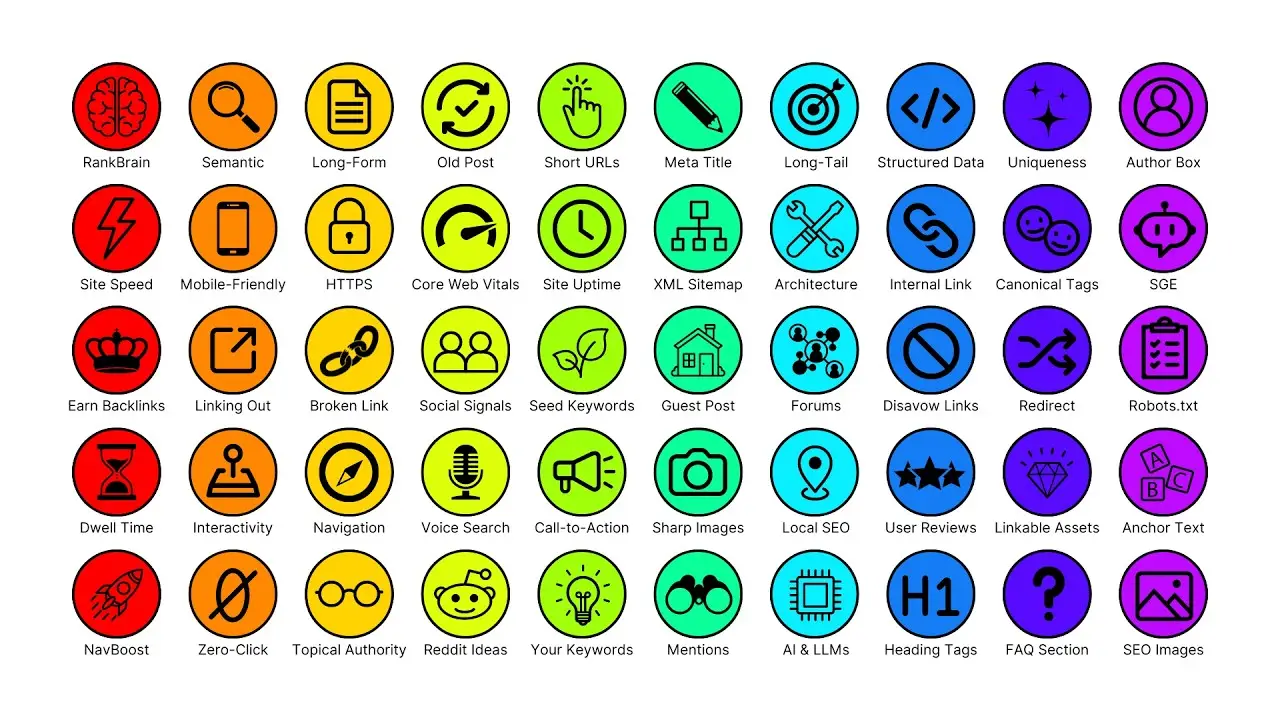Key takeaways:
- Focus on user intent and create relevant content.
- Optimize site speed and mobile-friendliness for better rankings.
- Regularly update content and use structured data markup.
SEO can be tricky, especially with all the changes happening in the digital landscape. You might feel overwhelmed trying to keep up with the latest strategies. This article is here to help you simplify that process.
We’ll go through 50 practical SEO tips that can boost your site’s performance without getting lost in technical jargon. Whether you’re a newbie or have some experience, there’s something here for everyone.
Optimize for Google RankBrain
Google’s RankBrain uses AI to understand what users really want when they search. Instead of just matching keywords, focus on creating content that answers specific questions.
Use Semantic SEO
Incorporate related terms and phrases with your main keywords. This helps Google grasp the context of your content better.
Create Long-Form Content
Articles over 1400 words tend to rank higher. Make sure your content is thorough rather than just long for the sake of it.
Update Old Content Regularly
Keep your blog posts fresh by updating them at least every six months. This keeps them relevant and can improve their rankings.
Use Short URLs
Short, keyword-rich URLs are easier to remember and perform better in search results.
Write Compelling Titles and Descriptions
Craft engaging titles and meta descriptions to improve click-through rates. Make sure they resonate with your audience.
Target Long-Tail Keywords
Long-tail keywords are more specific and often easier to rank for than general ones.
Implement Structured Data Markup
Using schema markup helps search engines understand your content type better, increasing your chances of appearing in rich snippets.
Create Unique Content
Your insights matter! Ensure your content offers something unique to avoid penalties for thin content.
Improve Site Speed
A fast-loading website enhances user experience and boosts rankings. If you’re using WordPress, limit the number of plugins you use.
Mobile Optimization is Key
Make sure your site is mobile-friendly since Google prioritizes mobile-first indexing. Don’t forget about desktop users too!
Use SSL Certificates
Switching to HTTPS not only secures your site but may also improve rankings.
Focus on Core Web Vitals
Metrics like Largest Contentful Paint (LCP) and Cumulative Layout Shift (CLS) impact user experience and rankings.
Ensure Site Uptime
Minimize downtime to avoid negatively impacting your rankings. Reliable hosting services like Kinsta or xCloud can help.
Create an XML Sitemap
Submitting an XML sitemap helps search engines index your pages effectively. Just remember to submit it once!
Implement Clean Site Architecture
A well-organized site structure helps Google crawl and index your content more efficiently.
Optimize Internal Linking
Link from high-authority pages to those needing more authority. Always link to relevant pages on your site when possible.
Use Canonical Tags
Prevent duplicate content issues by indicating the preferred version of a page with canonical tags.
Optimize for Google SGE
Create content that answers user queries directly to stay relevant in the AI-driven search landscape.
Earn High-Quality Backlinks
Focus on getting backlinks from reputable sites to boost your site’s authority. It’s challenging but worthwhile!
Link Out to Authority Sites
Linking to high-authority sites can enhance the credibility of your content.
Find Broken Link Building Opportunities
Identify broken links on authoritative sites, reach out, and offer your content as a replacement.
Leverage Social Signals
Encourage social sharing to increase visibility and potential backlinks for your content.
Use Creative Seed Keywords
Generate unique keywords that competitors may overlook using tools like Keyword Sheeter.
Engage in Guest Blogging
Writing guest posts for reputable blogs can earn you backlinks and introduce you to new audiences.
Participate in Industry Forums
Engaging in niche forums helps build relationships and earn backlinks. Reddit is a good starting point!
Use the Disavow Tool Carefully
Remove harmful backlinks that could hurt your rankings, but do this cautiously.
Implement Proper Redirects
Use 301 redirects for permanent moves and 302 for temporary ones to guide both users and search engines correctly.
Check Your Robots.txt File
Ensure it’s not blocking important pages; this file is usually configured by SEO plugins automatically.
Enhance Dwell Time
Create engaging content that keeps users on your page longer, signaling its value to Google.
Use Interactive Content
Incorporate quizzes, polls, or videos to make your content more engaging for visitors.
Create User-Friendly Navigation
Make sure navigating your site is easy; this improves user experience and helps search engines crawl effectively.
Optimize for Voice Search
Use natural language and long-tail keywords to capture voice search queries effectively.
Implement Clear Calls-to-Action (CTAs)
Use compelling CTAs throughout your content to guide users toward desired actions.
Use High-Quality Images and Videos
Enhance engagement with relevant visuals; avoid low-resolution or watermarked images unless necessary.
Optimize for Local SEO
Ensure consistent business information across directories and optimize for local keywords to improve visibility.
Encourage User Reviews
Positive reviews can enhance credibility and improve local search rankings significantly.
Promote Linkable Assets
Create high-value content like infographics or tools that naturally attract backlinks over time.
Descriptive Anchor Text Matters
Clear anchor text helps users understand where links lead, benefiting both users and search engines alike.
Utilize Google’s NavBoost
Improve metrics like click-through rates (CTR) and dwell time to benefit from NavBoost rewards from Google.
Optimize for Zero-Click Searches
Provide direct answers to common queries; this increases brand visibility even if it doesn’t drive traffic directly.
Focus on Topical Authority
Build comprehensive content around specific topics to establish authority in your niche over time.
Use Reddit for Keyword Research
Find out what questions people ask in relevant subreddits; it’s a goldmine for content ideas!
Create Your Own Keywords
Coin unique terms related to your brand or products; this can help dominate search results for those terms.
Monitor Non-Link Mentions
Track mentions of your brand without links; leverage these opportunities later for backlinks or collaborations.
Adapt to AI Trends
Stay updated with AI advancements; integrating them into your strategy keeps you competitive in SEO efforts today.
These tips are based on recent insights and algorithm leaks, providing actionable strategies for enhancing SEO efforts in 2024 while keeping things straightforward!
FAQs
What are long-tail keywords?
Long-tail keywords are specific phrases that target niche audiences, making them easier to rank for than broader terms.
How often should I update my blog posts?
It’s good practice to update old blog posts at least every six months to keep them relevant and improve their rankings.
Why is site speed important?
A fast-loading website enhances user experience, which can positively impact search engine rankings.
What is structured data markup?
Structured data markup helps search engines understand the context of your content better, improving chances of appearing in rich snippets.
How do I earn high-quality backlinks?
Focus on creating valuable content that others want to link back to, engage in guest blogging, or participate in industry forums.






